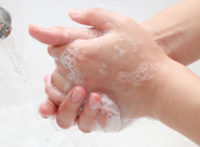There is no universal solution, but hospitals can take these steps to encourage staff to wash their hands:
1. Invest in alcohol-based hand rub. In many cases this is more effective than washing hands with soap and water. When introduced, one study showed adherence rates increased from 28 percent to 47 percent.
2. The study revealed offering staff personal bottles of hand sanitizer increased adherence rates from 48 per cent to 66 per cent
3. Some hospital have trialed methods to improve compliance with hand sanitizer, for example installing video cameras in front of sinks and dispensers
4. Peer pressure - enlisting front line health care personnel to provide immediate positive and negative feedback to colleagues can help compliance
During one site visit, an infectious diseases doctor involved in preventing infections said: “Getting the surgeons to adopt things in general is problematic … they’re like baseball players, they’ve got superstitions…in their minds if it’s working, why should we change it.”
At least you know who these people are since they speak up at meetings and actively resist changing behavior.
The second type of resistor is individuals who often have nothing against an initiative per se but simply enjoy exercising their power by refusing to change, although their behavior is below the radar.
Another barrier: many hospitals have a culture of mediocrity rather than a culture of excellence. These hospitals are content to be just good enough. Leadership is generally ineffective. Overperformers are rewarded with more work.
Source: The Daily Mail (UK) www.dailymail.co.uk






